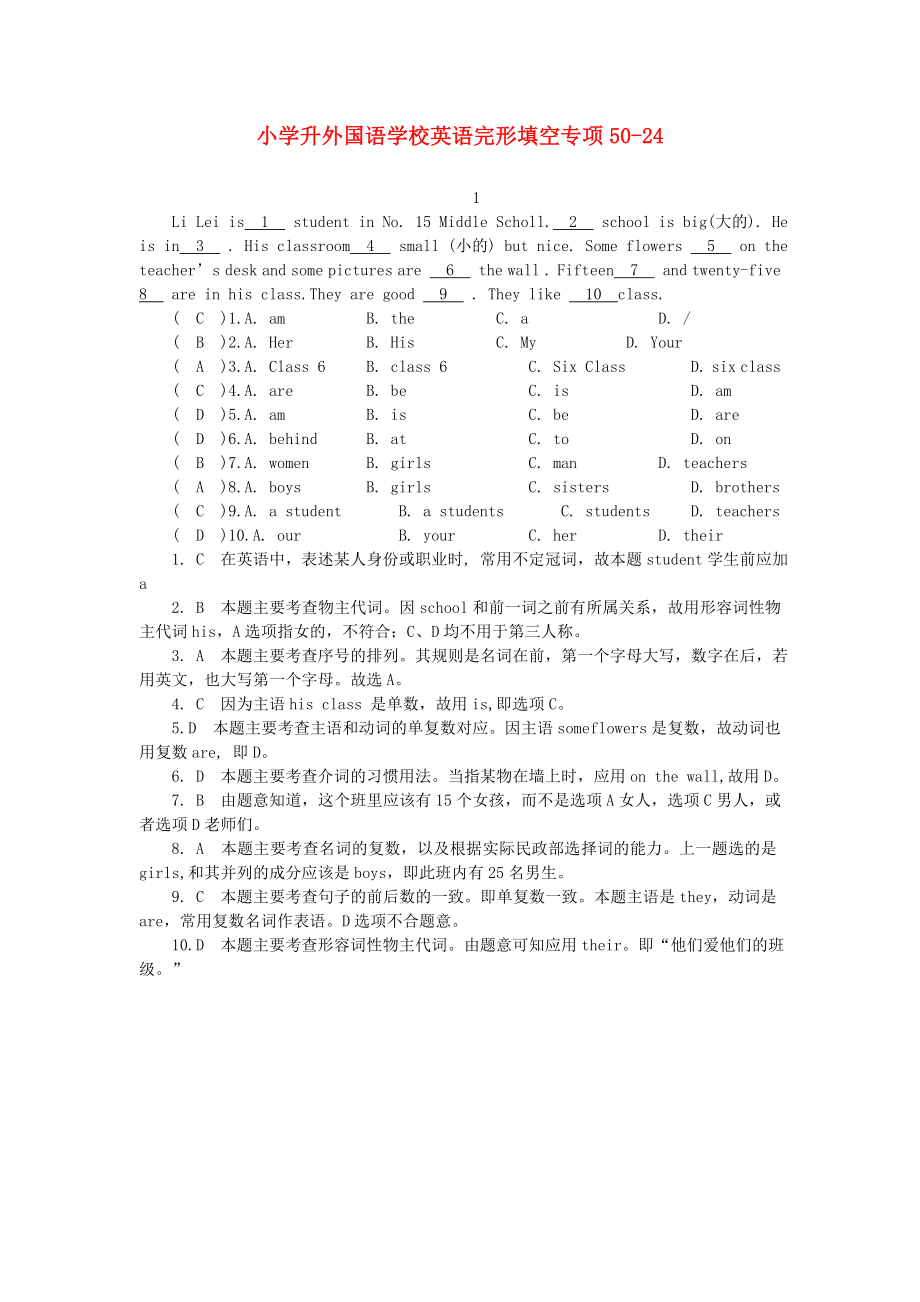《寧夏外國(guó)語(yǔ)學(xué)校小升初英語(yǔ)專項(xiàng)訓(xùn)練 完形填空24》由會(huì)員分享,可在線閱讀�����,更多相關(guān)《寧夏外國(guó)語(yǔ)學(xué)校小升初英語(yǔ)專項(xiàng)訓(xùn)練 完形填空24(2頁(yè)珍藏版)》請(qǐng)?jiān)谘b配圖網(wǎng)上搜索�����。
1���、小學(xué)升外國(guó)語(yǔ)學(xué)校英語(yǔ)完形填空專項(xiàng)50-24
1
Li Lei is 1 student in No. 15 Middle Scholl. 2 school is big(大的). He is in 3 . His classroom 4 small (小的) but nice. Some flowers 5 on the teacher’s desk and some pictures are 6 the wall . Fifteen 7 and twenty-five 8 are in his class.They are good
2��、 9 . They like 10 class.
( C )1.A. am B. the C. a D. /
( B )2.A. Her B. His C. My D. Your
( A )3.A. Class 6 B. class 6 C. Six Class D. six class
( C )4.A. are B. be C. is D. am
( D )5.A. am B. is C. be D. are
( D )6.A. behind B. at C. to
3���、 D. on
( B )7.A. women B. girls C. man D. teachers
( A )8.A. boys B. girls C. sisters D. brothers
( C )9.A. a student B. a students C. students D. teachers
( D )10.A. our B. your C. her D. their
1. C 在英語(yǔ)中,表述某人身份或職業(yè)時(shí), 常用不定冠詞��,故本題student學(xué)生前應(yīng)加 a
2. B 本題主要考查物主代詞�����。因scho
4、ol和前一詞之前有所屬關(guān)系�,故用形容詞性物主代詞his,A選項(xiàng)指女的���,不符合��;C�����、D均不用于第三人稱�。
3. A 本題主要考查序號(hào)的排列����。其規(guī)則是名詞在前,第一個(gè)字母大寫(xiě)���,數(shù)字在后,若用英文���,也大寫(xiě)第一個(gè)字母�。故選A。
4. C 因?yàn)橹髡Z(yǔ)his class 是單數(shù)��,故用is,即選項(xiàng)C���。
5. D 本題主要考查主語(yǔ)和動(dòng)詞的單復(fù)數(shù)對(duì)應(yīng)��。因主語(yǔ)some flowers是復(fù)數(shù)��,故動(dòng)詞也用復(fù)數(shù)are, 即D��。
6. D 本題主要考查介詞的習(xí)慣用法���。當(dāng)指某物在墻上時(shí),應(yīng)用on the wall,故用D��。
7. B 由題意知道�,這個(gè)班里應(yīng)該有15個(gè)女孩,而不是選項(xiàng)A女人����,選項(xiàng)C男人,或者
5����、選項(xiàng)D老師們���。
8. A 本題主要考查名詞的復(fù)數(shù),以及根據(jù)實(shí)際民政部選擇詞的能力���。上一題選的是girls,和其并列的成分應(yīng)該是boys�,即此班內(nèi)有25名男生���。
9. C 本題主要考查句子的前后數(shù)的一致��。即單復(fù)數(shù)一致����。本題主語(yǔ)是they�����,動(dòng)詞是are�,常用復(fù)數(shù)名詞作表語(yǔ)。D選項(xiàng)不合題意��。
10.D 本題主要考查形容詞性物主代詞��。由題意可知應(yīng)用their�。即“他們愛(ài)他們的班級(jí)?���!?
2
In our classroom you can see there is a 1 of a park on the back(后面的)wall. Yo
6、u can also see many children 2 the park. There is a river in it. Near the river there are not 3 , but there are many trees. Many 4 are singing in them. Near the trees there are some old men. They are sitting at a table. They are 5 tea and talking. There are two girls over there. They
7�����、6 new blouses. They are talking near the river. We can also see two boats in the picture. One is 7 but in 8 boat there are many children. Are there any young men in the 9 ? Let me see, there are some. They are swimming now. What are the boys doing? They are 10 there.
( D )1.A. map
8����、 B. children’s clothes C. lake D. picture
( C )2.A. of B. on C. in D. under
( C )3.A. some flower B. flower C. any flowers D. some flowers
( D )4.A. cats B. apples C. dogs D. birds
( D )5.A. drink B. eat C. eating D. drinking
( C )6.A. put on B. wearing on C. ar
9、e wearing D. are putting on
( B )7.A. full B. empty C. big D. small
( A )8.A. the other B. others C. another D. other
( A )9.A. river B. basket C. bag D. box
( A )10.A. playing football B. playing the football
C. play football D. play the football
1. D a picture
10����、of a park意為“一幅公園的畫(huà)?���!?
2. C in the park。意為“在公園里���?���!?
3. C any 用于否定句或疑問(wèn)句。some用于肯定句����。
4. D 能夠在樹(shù)上唱歌的應(yīng)是鳥(niǎo),而不是其它三項(xiàng)貓�����、蘋(píng)果�、狗。
5. D 表示喝茶用drink��,不用eat�����。另外�����,and前后的謂語(yǔ)動(dòng)詞形式要一致�,所以drink要加-ing,構(gòu)成現(xiàn)在進(jìn)行時(shí)�。
6. C wear是“穿著”����,“戴著”��,強(qiáng)調(diào)狀態(tài)����,用現(xiàn)在進(jìn)行時(shí)表示此刻的狀態(tài)��。Put on是“穿上”���、“戴上”��,強(qiáng)調(diào)動(dòng)作�。
7. B 根據(jù)下文在另一只船里有許多孩子們表轉(zhuǎn)折關(guān)系�����,說(shuō)明本句應(yīng)是一只船是空的����。
8. A 表示兩者范圍之內(nèi)“一個(gè)是……,另一個(gè)是……”用one is …����,the other is …
9. A 下文說(shuō)有一些人在游泳���,說(shuō)明本句應(yīng)問(wèn)在河里有一些年輕人嗎?
10.A 球類運(yùn)動(dòng)前不要冠詞
 寧夏外國(guó)語(yǔ)學(xué)校小升初英語(yǔ)專項(xiàng)訓(xùn)練 完形填空24
寧夏外國(guó)語(yǔ)學(xué)校小升初英語(yǔ)專項(xiàng)訓(xùn)練 完形填空24

